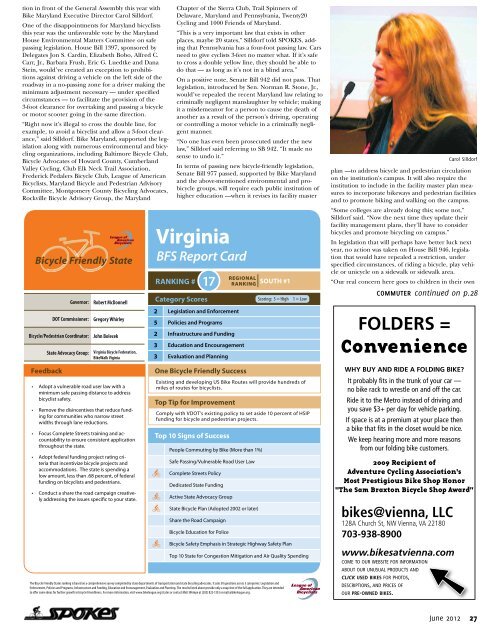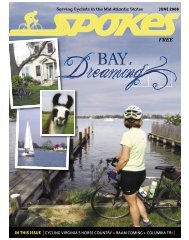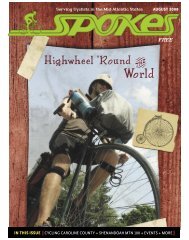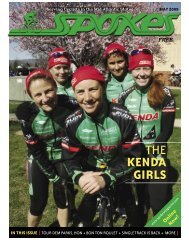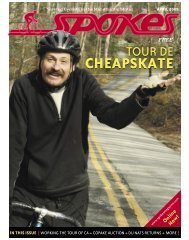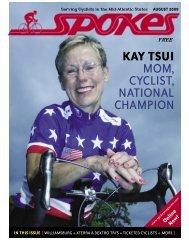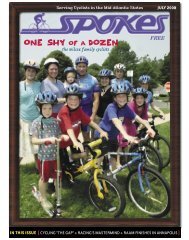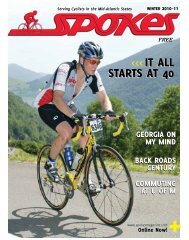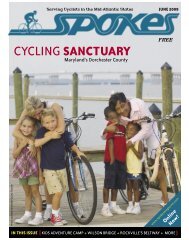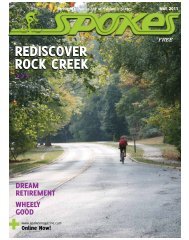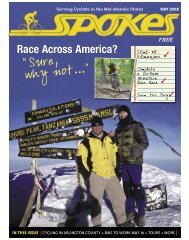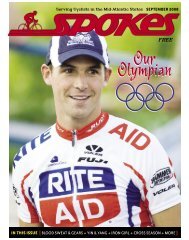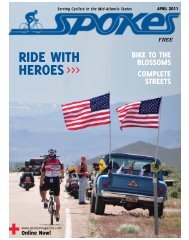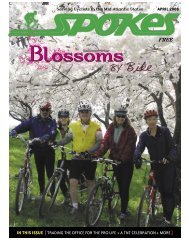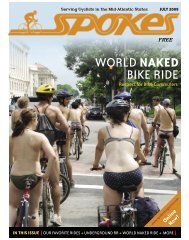June 2012 ~ 9MB - Spokes Magazine
June 2012 ~ 9MB - Spokes Magazine
June 2012 ~ 9MB - Spokes Magazine
You also want an ePaper? Increase the reach of your titles
YUMPU automatically turns print PDFs into web optimized ePapers that Google loves.
tion in front of the General Assembly this year with<br />
Bike Maryland Executive Director Carol Silldorf.<br />
One of the disappointments for Maryland bicyclists<br />
this year was the unfavorable vote by the Maryland<br />
House Environmental Matters Committee on safe<br />
passing legislation. House Bill 1397, sponsored by<br />
Delegates Jon S. Cardin, Elizabeth Bobo, Alfred C.<br />
Carr, Jr., Barbara Frush, Eric G. Luedtke and Dana<br />
Stein, would’ve created an exception to prohibitions<br />
against driving a vehicle on the left side of the<br />
roadway in a no-passing zone for a driver making the<br />
minimum adjustment necessary — under specified<br />
circumstances — to facilitate the provision of the<br />
3-foot clearance for overtaking and passing a bicycle<br />
or motor scooter going in the same direction.<br />
“Right now it’s illegal to cross the double line, for<br />
example, to avoid a bicyclist and allow a 3-foot clearance,”<br />
said Silldorf. Bike Maryland, supported the legislation<br />
along with numerous environmental and bicycling<br />
organizations, including Baltimore Bicycle Club,<br />
Bicycle Advocates of Howard County, Cumberland<br />
Valley Cycling, Club Elk Neck Trail Association,<br />
Frederick Pedalers Bicycle Club, League of American<br />
Bicyclists, Maryland Bicycle and Pedestrian Advisory<br />
Committee, Montgomery County Bicycling Advocates,<br />
Rockville Bicycle Advisory Group, the Maryland<br />
Governor:<br />
DOT Commissioner:<br />
Bicycle/Pedestrian Coordinator:<br />
Feedback<br />
State Advocacy Group:<br />
Robert McDonnell<br />
Gregory Whirley<br />
John Bolecek<br />
Virginia Bicycle Federation,<br />
BikeWalk Viginia<br />
• Adopt a vulnerable road user law with a<br />
minimum safe passing distance to address<br />
bicyclist safety.<br />
• Remove the disincentives that reduce funding<br />
for communities who narrow street<br />
widths through lane reductions.<br />
• Focus Complete Streets training and accountability<br />
to ensure consistent application<br />
throughout the state.<br />
• Adopt federal funding project rating criteria<br />
that incentivize bicycle projects and<br />
accommodations. The state is spending a<br />
low amount, less than .68 percent, of federal<br />
funding on bicyclists and pedestrians.<br />
• Conduct a share the road campaign creatively<br />
addressing the issues specific to your state.<br />
Chapter of the Sierra Club, Trail Spinners of<br />
Delaware, Maryland and Pennsylvania, Twenty20<br />
Cycling and 1000 Friends of Maryland. <br />
“This is a very important law that exists in other<br />
places, maybe 20 states,” Silldorf told SPOKES, adding<br />
that Pennsylvania has a four-foot passing law. Cars<br />
need to give cyclists 3-feet no matter what. If it’s safe<br />
to cross a double yellow line, they should be able to<br />
do that — as long as it’s not in a blind area.”<br />
On a positive note, Senate Bill 942 did not pass. That<br />
legislation, introduced by Sen. Norman R. Stone, Jr.,<br />
would’ve repealed the recent Maryland law relating to<br />
criminally negligent manslaughter by vehicle; making<br />
it a misdemeanor for a person to cause the death of<br />
another as a result of the person's driving, operating<br />
or controlling a motor vehicle in a criminally negligent<br />
manner.<br />
“No one has even been prosecuted under the new<br />
law,” Silldorf said referring to SB 942. “It made no<br />
sense to undo it.”<br />
In terms of passing new bicycle-friendly legislation,<br />
Senate Bill 977 passed, supported by Bike Maryland<br />
and the above-mentioned environmental and probicycle<br />
groups, will require each public institution of<br />
higher education —when it revises its facility master<br />
Virginia<br />
BFS Report Card<br />
RANKING #<br />
17<br />
Category Scores Scoring: 5 = High 1 = Low<br />
2 Legislation and Enforcement<br />
5 Policies and Programs<br />
2 Infrastructure and Funding<br />
One Bicycle Friendly Success<br />
Top Tip for Improvement<br />
Top 10 Signs of Success<br />
REGIONAL<br />
RANKING<br />
3 Education and Encouragement<br />
3 Evaluation and Planning<br />
SOUTH #1<br />
Existing and developing US Bike Routes will provide hundreds of<br />
miles of routes for bicyclists.<br />
Comply with VDOT’s existing policy to set aside 10 percent of HSIP<br />
funding for bicycle and pedestrian projects.<br />
People Commuting by Bike (More than 1%)<br />
Safe Passing/Vulnerable Road User Law<br />
Complete Streets Policy<br />
Dedicated State Funding<br />
Active State Advocacy Group<br />
State Bicycle Plan (Adopted 2002 or later)<br />
Share the Road Campaign<br />
Bicycle Education for Police<br />
Bicycle Safety Emphasis in Strategic Highway Safety Plan<br />
Top 10 State for Congestion Mitigation and Air Quality Spending<br />
The Bicycle Friendly States ranking is based on a comprehensive survey completed by state departments of transportation and state bicycling advocates. It asks 50 questions across 5 categories: Legislation and<br />
Enforcement, Policies and Programs, Infrastructure and Funding, Education and Encouragement, Evaluation and Planning. The results listed above provide only a snap shot of the full application. They are intended<br />
to offer some ideas for further growth in bicycle friendliness. For more information, visit www.bikeleague.org/states or contact Matt Wempe at (202) 822-1333 or matt@bikeleague.org.<br />
plan —to address bicycle and pedestrian circulation<br />
on the institution's campus. It will also require the<br />
institution to include in the facility master plan measures<br />
to incorporate bikeways and pedestrian facilities<br />
and to promote biking and walking on the campus.<br />
“Some colleges are already doing this; some not,”<br />
Silldorf said. “Now the next time they update their<br />
facility management plans, they’ll have to consider<br />
bicycles and promote bicycling on campus.”<br />
In legislation that will perhaps have better luck next<br />
year, no action was taken on House Bill 946, legislation<br />
that would have repealed a restriction, under<br />
specified circumstances, of riding a bicycle, play vehicle<br />
or unicycle on a sidewalk or sidewalk area.<br />
“Our real concern here goes to children in their own<br />
FOLDERS =<br />
Convenience<br />
Why buy and ride a folding bike?<br />
It probably fits in the trunk of your car —<br />
no bike rack to wrestle on and off the car.<br />
Ride it to the Metro instead of driving and<br />
you save $3+ per day for vehicle parking.<br />
If space is at a premium at your place then<br />
a bike that fits in the closet would be nice.<br />
We keep hearing more and more reasons<br />
from our folding bike customers.<br />
2009 Recipient of<br />
Adventure Cycling Association's<br />
Most Prestigious Bike Shop Honor<br />
"The Sam Braxton Bicycle Shop Award"<br />
bikes@vienna, LLC<br />
128A Church St, NW Vienna, VA 22180<br />
703-938-8900<br />
www.bikesatvienna.com<br />
come to our website for information<br />
about our unusual products and<br />
click used bikes for photos,<br />
descriptions, and prices of<br />
our pre-owned bikes.<br />
Carol Silldorf<br />
commuter continued on p.28<br />
<strong>June</strong> <strong>2012</strong><br />
27


